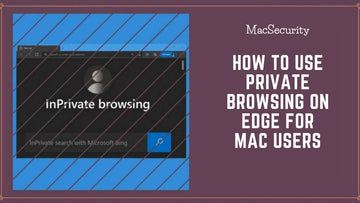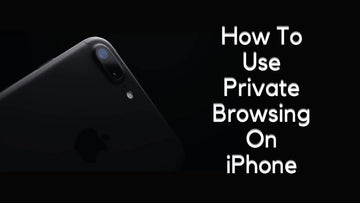How to Use Private Browsing on Opera for Mac Users
by Chelsea Bruhl on Sep 26, 2024

Private browsing in Opera is a little different than in other browsers. Opera now offers tracking protection in addition to not recording your online browsing history.
This will prevent sections of websites from tracking your browser history across various websites.
Have you ever gone to a travel website to conduct some research for a vacation and then saw advertisements for the same location when browsing other websites?
As you browse, you are being monitored. When you’re using Opera in private mode, this won’t happen.
In this article, MacSecurity will show you how to use private browsing on Opera for Mac users so you stay secure while browsing the web
How to Use Private Browsing on Opera for Mac Users
How do you Enable and Use Private Mode in Opera on a Mac

To enable private browsing in Opera, click New InPrivate Window from the three dot menu at the top right.
You may also use the keyboard shortcut Ctrl + Shift + N or if you’re using a Mac, then enter Shift + ⌘ + N.
Because of the glasses and the hat icon on the screen, you’ll know you’re in private mode.
How to Open a Link in Private Browsing Mode in Opera

You can also open specific links in private mode by following these steps:
- To open a context menu, right-click the link on the current web page. On Mac, you have to hold the Ctrl key when right-clicking on the link.
- Select Open in Private Tab
The link’s destination page should be displayed in a private tab or window. To be sure you’re in Private mode, look for the purple and white mask in the page’s title bar.
How to Use a Private Browser on Opera for iPhone's and iPad's

Opera for iOS is a sleek and customizable app that offers plenty of privacy and security for a safe browsing experience. In order to open a private browser window on Opera for iPhone, you’d have to follow these steps.
- Open the Opera app on your iPhone.
- Tap on the hamburger menu icon in the footer of the browser.
- In the pop-up you will find Private Mode, click on it to launch a Private tab
If you’re looking to close the private window in Opera, you will have to open the tabs icon and then tap on the private tab and close the tab that is open.
Bonus Content -- How to Use a Private Browser on Opera for Android Devices

Quite similar to the iOS flow, you can start a private browsing session on your Android device by following a few steps:
- Open the Opera app by tapping on the icon. Once the app opens, click on the Switch tab icon and select Private Mode.
- Search for the web address by entering it in the address bar. Whatever you open will be in private and no cookies or site data gets stored.
You can switch between the private browser and the standard Opera browser window by tapping on the numeric icon near the address bar.
Click on the switch tab icon to view the list of private tabs that are open and tap on the square to pull up the standard browser tabs that are open in the background.
You are able to close private windows by tapping on the X next to each open tab. Similarly, tapping on the vertical three dots at the top of the page will let you close all private browsers in one go.
What Features are bundled with Opera Private Browsing
Opera Tracking Protection – With Tracking Protection, Opera goes beyond private surfing. It prevents businesses from tracking you across the internet.
It makes use of a compiled list of tracking sites from disconnect.me. Tracking Protection prevents cookies from accessing any of the sites in the list.
What data Is not stored while using the Opera private browser?
During a browsing session, Opera saves a lot of information on your computer.
A lot of this data is either never kept locally or immediately deleted when you close a private tab or window when Private Browsing mode is enabled. This is useful when using a shared computer to browse the internet.
At the end of a Opera Private Browsing session, the following data is not left behind:
- Download history
- Browsing history
- Cache
- Cookies
- Search bar keywords
- Saved passwords
The one thing that will not get deleted automatically is the downloaded files and the auto-fill data. These will have to be manually deleted once you're done with your browsing session.
Is Opera Private Mode Really Private?
Incognito or private mode will keep your local surfing secret, but your ISP, school, or workplace will still be able to see where you’ve been online. In reality, regardless of what you do, your ISP has access to all of your surfing behavior.
A Virtual Private Network (VPN) service, on the other hand, is an option. VPN services route traffic through remote servers, giving the impression that you’re browsing from another or several locations.
However, because VPN providers can watch your online behavior, it’s important to select a business you can trust to either delete or lock down your browsing history.
Advertisers’ third-party cookies will not be blocked by VPNs, but such cookies will be unable to properly identify your location, making ad trackers less effective.
Tor Browser is capable of completely concealing your internet activities. It reroutes traffic via a number of servers throughout the world, making it harder to monitor.
The website you’re visiting has no clue where you are; all it knows is the approximate location of the last server via which your request was routed.
However, even using a Tor proxy will not prevent third-party marketers from placing cookies in your browser. When Tor Browser is closed, it deletes all cookies. People may also erase their cookies by starting a new session with Tor Browser.
How to enable private browsing in Opera?
Click on the menu tab and then press on Private Mode to open a private browser. The change in color from white to black and the large notification on the screen that reads “You’re in Private Mode” shows you that you’re currently browsing in private mode and none of your online data is being tracked.
Is Opera browser safe to use?
Opera is developed based on the Chromium system that has a wide range of security and privacy features to protect your system from cyber attacks and hackers. The browser receives monthly updates that help enhance user experience and improves any data protection issues that might have been reported.
Does the Opera browser have a built-in VPN service?
Yes, Opera does come with a built-in VPN service that lets you hide your location while browsing the internet.
You can enable the Opera VPN extension by opening the Opera browser and clicking on the Opera menu.
From here tap on Preferences and then click on Privacy & Security to pull up the battery saver settings and the VPN settings.
Tap on enable VPN to activate it on the browser. Now every time you want to login in private, simply tap on the VPN extension and turn it on.
Your settings will be set to standard and if you want to choose an alternate service, you can by selecting a new virtual location.
Takeaway
Overall, Opera’s implementation of private browsing is excellent in terms of privacy and security, and it is highly recommended for anyone who needs to keep their browsing history hidden.
Also Read:





